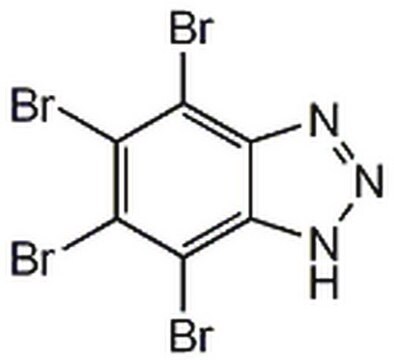T6951
TBBz
≥98% (HPLC), powder
Synonyme(s) :
4,5,6,7-Tetrabromobenzimidazole
About This Item
Produits recommandés
Pureté
≥98% (HPLC)
Forme
powder
Solubilité
DMSO: >10 mg/mL at 60 °C, clear
Température de stockage
2-8°C
Chaîne SMILES
Brc1c(Br)c(Br)c2[nH]cnc2c1Br
InChI
1S/C7H2Br4N2/c8-2-3(9)5(11)7-6(4(2)10)12-1-13-7/h1H,(H,12,13)
Clé InChI
LOEIRDBRYBHAJB-UHFFFAOYSA-N
Application
Actions biochimiques/physiologiques
Notes préparatoires
Code de la classe de stockage
11 - Combustible Solids
Classe de danger pour l'eau (WGK)
WGK 3
Point d'éclair (°F)
Not applicable
Point d'éclair (°C)
Not applicable
Équipement de protection individuelle
Eyeshields, Faceshields, Gloves, type P2 (EN 143) respirator cartridges
Certificats d'analyse (COA)
Recherchez un Certificats d'analyse (COA) en saisissant le numéro de lot du produit. Les numéros de lot figurent sur l'étiquette du produit après les mots "Lot" ou "Batch".
Déjà en possession de ce produit ?
Retrouvez la documentation relative aux produits que vous avez récemment achetés dans la Bibliothèque de documents.
Notre équipe de scientifiques dispose d'une expérience dans tous les secteurs de la recherche, notamment en sciences de la vie, science des matériaux, synthèse chimique, chromatographie, analyse et dans de nombreux autres domaines..
Contacter notre Service technique






